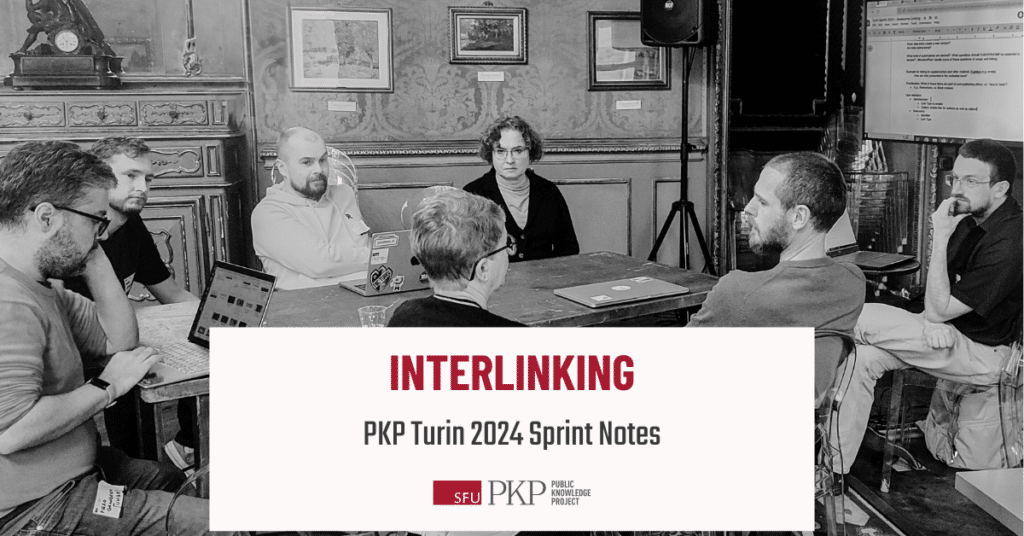PKP Turin 2024 Sprint notes: Interlinking

The Interlinking summary from the PKP Turin Sprint, hosted by the CRAFT-OA project in October 2024, is now available.
Sprints involve PKP community members joining diverse groups to work on PKP software and support. In October, the CRAFT-OA project and the University of Turin hosted eight working groups at the PKP Turin Sprint. This is a summary of one such group’s work.
Abstract
Published artifacts are commonly interrelated; the group intends to express those relationships in hyperlinks and metadata. The group tried to enumerate these relationships and then categorized these relationships in two aspects. To the group’s consideration those relationships that should be internal to the product (e.g., errata/corrections), vs. those that may be external relationships outside the product (e.g., preprints / published articles). We also considered those relationships that are important components of publishing ethics (e.g. retractions) vs. those that are nice-to-have (e.g. related publications/preprints). We further identified important taxonomies and related work to consider in developing this linking function.
Working Group members
- Clinton Graham, University of Pittsburgh
- Antti-Jussi Nygård, The Federation of Finnish Learned Societies
- Isabella Meinecke, Hamburg State and University Library
- Luis Montilla, Crossref
- Tim Wakeford, Ubiquity Press
- Lucia Steele, Aboutscience
- Kay Pepping, OpenJournals.nl
- Piero Grandesso, University of Bologna
- Natalie Marty, Swiss Medical Weekly / SMW supporting association
Background
We have already captured the relationship between an OPS preprint and a published article.
We should also capture the relationships of:
- Article-to-Data Connections
- Github
- This involves metadata alignment with platforms like Crossref and DataCite, both of which provide detailed guidance on data citation and software linking requirements.
- Examples:
- Open Humanities Data
- Nature (section at end of article)
- eLife (with usage info)
- Preprint Linkages
- Editors may be interested in finding preprints and this relationship can be useful for authenticating the research process
- Reference to reviews on the preprints
- Documentation of publication timeline
- Who is responsible? Authors, could occur at submission, or a later stage
- Metadata expression: Crossref
- Errata/Corrections
- Less of a “setting” and more “core functionality”
- PubMed example
- Who is responsible? Editors
- Invitations- out of scope
- Addendum
- Retraction
- Less of a “setting” and more “core functionality”
- May not have an analog as a setting: this may be a decision, not an attribute of the submission/publication.
- Crossref has recommendations for display
- Code should determine the display, not the editorial team(PubMed example)
- https://github.com/pkp/pkp-lib/issues/1813#issuecomment-1053547856
- Comments (letters to the editor) to replies and both to the original publication
- Editorial to a commented article and vice versa
- Topic Collection (Related Articles)
- Distinction between groups of articles vs. 1:1 relationships
- E.g.: https://goethe-lexicon.pitt.edu/GL/article/view/51
- Reviews (Articles/Books)
- Who is responsible? Author in Objects for Review plugin
- OJS/OMP could be the source or could be the review
- Books to be reviewed plugin (in use)
- Peer Review
- Working on this in 3.6
- Working on this in 3.6
- Components: e.g. Book Chapters
- Hierarchical relationships
- Article with a foreword by another author
- Translations
- This means link submissions to other links
Note the COAR Notify initiative: https://coar-repositories.org/what-we-do/notify/ as an example for external linking: “COAR Notify allows repositories to send and receive messages to other ‘Notify-enabled’ platforms, supporting the interlinking of related resources across the scholarly ecosystem.”
- This means link submissions to other links
Goals
- Identify the different use cases
- Find examples in other journals
- How should it look, how should it function?
- Solutions in the core as well as in the plugin
Results
Types of linking of interest:
- Internal relationships should be in the core (artifacts in the same installation that are important when considering publishing ethics)
- Retractions: important for academic integrity, planned in 3.6
- Errata/Correction/Addendums: important for academic integrity
- Peer Reviews: important for academic integrity, planned in 3.6
- Translations, where the article text is published in multiple languages: important for discovery/usability
- External relationships should be in the core (artifacts outside of the installation that are important when considering publishing ethics)
- Data citations: important for reproducibility
- Preprint to article: Already a part of OPS
- Reviews of books/articles etc.: already part of Objects for Review
- Internal relationships that could be exposed by a plugin (artifacts in the same installation where links would be nice to have)
- Comments, Letters: relates a response to the original work, often contains the citation inline
- Components, e.g. Book Chapters: relates in part to a larger whole
- External relationships that could be exposed by a plugin (artifacts outside of the installation where links would be nice to have)
- Article to preprints
- Translations, where the text is a translation of an external artifact.
- Related articles
Important taxonomies:
- Crossref (types of relationships)
- COAR (types of resources)
- Retraction Watch Database (reasons for retraction)
Other work to consider:
- 3.6 will formalize peer review and article retractions
- 3.5 will create language slugs in the URI, allowing DOIs for specific translations
- COAR Notify
Next Steps
The University of Pittsburgh will look at short term development options for 3.5 which can build on / build toward plans for the work for 3.6.
Thank you
We once again thank the Sprint host institutions, and all participants for their valuable contributions to the PKP user community. Special thanks to the CRAFT-OA Project and the University of Turin for their support and partnerships.
